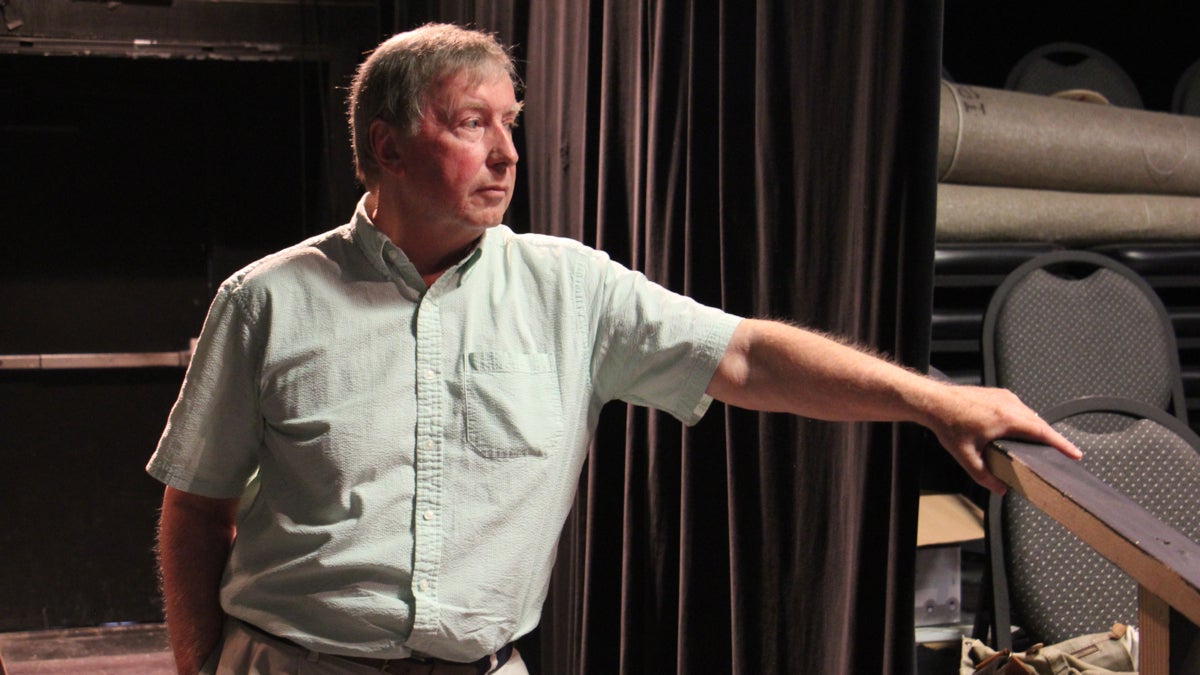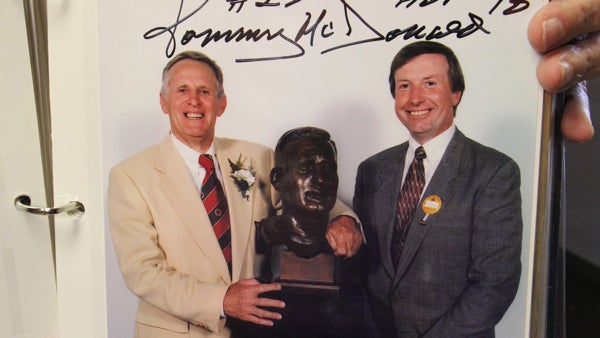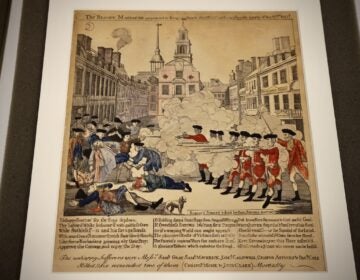New play with Ray Didinger byline focuses on a legendary Eagles Hall of Fame campaign
Listen
Ray Didinger watches a rehearsal for "Tommy and Me." (WHYY News)
This week, a legendary Philadelphia sportswriter will make his debut as a playwright.
Ray Didinger, who has been chronicling the Eagles in newspapers and on the radio and on television for almost 50 years, saved his personal story for the stage.
When Didinger was 9 years old, he spent his summer in Hershey, Pennsylvania, where the Eagles used to practice. That’s where he met wide receiver Tommy McDonald. He got his autograph — and an offer to carry the rookie’s helmet to the locker room.
“When Tommy McDonald joined the Eagles in 1957, he immediately became my favorite player,” said Didinger. “He was the smallest guy on the team. He looked like a little kid out there playing with the giants. As a 9-year-old, you identify with him. I did, and all my friends did. We all loved Tommy McDonald.”
 Ray Didinger holds a photo of himself (right) and Tommy McDonald taken at the Hall of Fame induction. (Emma Lee/WHYY)
Ray Didinger holds a photo of himself (right) and Tommy McDonald taken at the Hall of Fame induction. (Emma Lee/WHYY)
That boy grew up to be one of the best football writers in the country. When Didinger became a voting member of the Football Hall of Fame, the first thing he did was push to have McDonald inducted.
McDonald had the stats — before retiring in 1968, he was one of the best wide receivers in the league. But that wasn’t enough.
“His career was odd. He bounced to five different teams. A lot weren’t very good,” said Didinger. “The Hall honors the guys that win champions and play for the great teams. Players on lesser teams are forgotten. That happened to Tommy.”
Didinger’s play, “Tommy and Me,” is about his 10-year campaign to get McDonald into the Hall of Fame.
The title of the play is also a list of its characters: Tommy is played by two actors, as the young rookie Tommy and the older, retired Tommy; likewise Didinger is portrayed as both a 10-year-old boy and as an adult.
Didinger has never written a play before. “My wife is the theater person,” he said. “I got into theater through her. But appreciating theater and making theater are two different things.”
He handed a script to the only person he knew in the theater world: Joe Canuso, artistic director of the Theater Exile who produced the classic sports play “The Philly Fan” by Bruce Graham.
“I thought it was a great story. It had a lot of potential,” said Canuso of that first draft. He brought in Graham to doctor the structure.
The story hops back and forth in time. Occasionally the older Ray, an objective newspaper reporter, is in dialogue with the younger Ray, an unabashed fan.
“He pushes him to be a fan,” said Canuso. “The older Ray pushes back: ‘I can’t do that. It wouldnt be professional.’ There’s something going on inside of him as a person, wanting to get excited, and wanting to maintain his professional demeanor.”
The younger Ray advises the older how to pitch Tommy McDonald to the Hall of Fame.
“I’m trying to make the case based on his career and his stats,” said Didinger. “The young me says to the adult me, ‘Tell them about Hershey, about carrying his helmet. Why does it have to be about the numbers? Why don’t you tell them about your heart?’
“These are hardcore journalists. If I start talking about boyhood heroes, they aren’t going to take me seriously. But the reason you’re doing this has to do with what’s in here,” said Didinger, tapping his chest. “Not the stat sheet.”
Didinger says he wanted this play to appeal to more than just sports fans, but there will definitely be more excitement in the Fringe Arts Building on Columbus Avenue when Tommy McDonald, himself, will be in attendance. He is expected to see one of the 12 performances.
WHYY is your source for fact-based, in-depth journalism and information. As a nonprofit organization, we rely on financial support from readers like you. Please give today.





